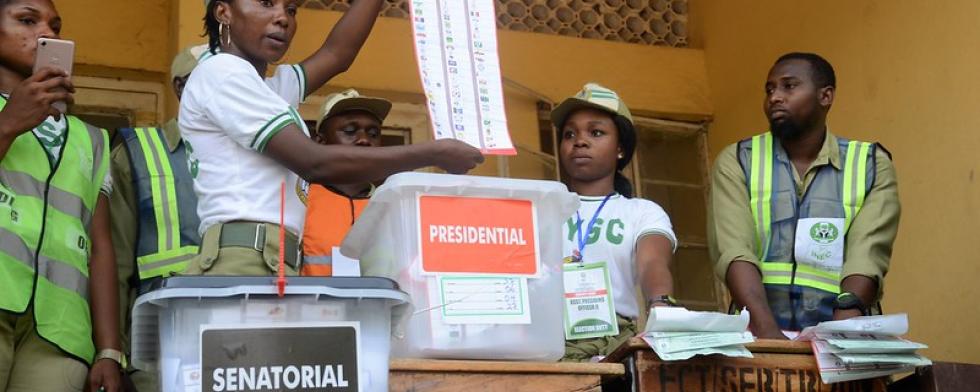Voting is one of the fundamental rights of every citizen in Nigeria. It is the means by which people elect their representatives, and by extension, determine the direction of their country. Despite the importance of voting, many people fail to exercise their rights, either out of ignorance, apathy or simply because of logistical challenges. The purpose of this article is to provide a comprehensive guide on how to exercise your voting rights on election day in Nigeria. The guide will cover everything from registration, voter education, and logistics to help you vote with ease.
 Part 1: Voter Registration
Part 1: Voter Registration
The first step to exercising your voting rights is to ensure that you are registered to vote. The Independent National Electoral Commission (INEC) is the body responsible for voter registration in Nigeria. To be eligible to register, you must be a Nigerian citizen, 18 years or older, and have a valid identification card. Voter registration takes place periodically, and INEC usually announces the dates for registration in advance. You can check the INEC website or visit their office to find out when the next registration exercise will take place.
During the registration process, you will be required to fill out a form and provide your personal details, including your name, date of birth, address, and identification number. You will also need to provide your fingerprint, which will be used to verify your identity on election day. After registration, you will be given a voter’s card, which you will need to present on election day to be allowed to vote.
Part 2: Voter Education
Voter education is essential in ensuring that citizens are aware of their voting rights and are equipped with the knowledge they need to participate in the electoral process. INEC and other civil society organizations carry out voter education programs to enlighten citizens on the electoral process, their rights, and responsibilities as voters. These programs are usually conducted in the run-up to an election and are aimed at reaching as many people as possible.
As a voter, it is important to participate in voter education programs to gain an understanding of the electoral process, the candidates, and the issues at stake. This will enable you to make informed decisions when it comes to choosing your preferred candidate. Voter education also helps to dispel myths and misconceptions about the electoral process, such as the idea that your vote does not count, which can discourage some people from voting.
Part 3: Voter Mobilization
Voter mobilization is the process of encouraging citizens to exercise their voting rights by turning out to vote on election day. This involves sensitizing citizens on the importance of voting, encouraging them to register to vote, and ensuring that they have the necessary information to enable them to vote. Voter mobilization is usually carried out by political parties, civil society organizations, and other groups interested in promoting democracy.
As a citizen, you can also play a role in voter mobilization by encouraging your friends, family members, and colleagues to register to vote and to turn out on election day. You can also participate in voter education programs and use your social media platforms to raise awareness about the electoral process.
Part 4: Preparing for Election Day
To ensure that you are able to exercise your voting rights on election day, it is important to prepare in advance. Here are some of the things you should do to prepare:
- Verify your registration: Before election day, it is important to verify that you are registered to vote. You can do this by checking the INEC website or visiting their office. If you have any issues with your registration, you should seek assistance from INEC officials.
- Know your polling unit: Your polling unit is the place where you will cast your vote on election day. It is important to know the location of your polling unit in advance to avoid any last-minute confusion. You can find out the location of your polling unit by checking your voter’s card or by visiting the INEC website.
- Plan your transportation: It is important to plan your transportation to your polling unit in advance. If you do not have your own means of transportation, you should arrange for a ride with friends, family members, or a local organization. You should also consider the distance to your polling unit and the time it will take to get there, to ensure that you arrive on time.
- Bring necessary documents: On election day, you will need to bring your voter’s card and a valid form of identification, such as a driver’s license or national ID card, to be allowed to vote. It is important to ensure that you have these documents with you before leaving for your polling unit.
- Dress appropriately: On election day, you should dress comfortably and appropriately for the weather. You should also avoid wearing any clothing or accessories that show support for a particular political party or candidate, as this is not allowed under INEC regulations.
Part 5: Voting on Election Day
On election day, you will need to follow certain procedures to cast your vote. Here is a step-by-step guide on how to vote:
- Arrive at your polling unit: You should arrive at your polling unit early, to avoid any delays or long lines.
- Join the queue: Join the queue of voters waiting to cast their votes. Make sure to maintain social distancing and follow all COVID-19 protocols.
- Present your documents: When it is your turn to vote, present your voter’s card and identification document to the INEC official.
- Verify your details: The INEC official will verify your details by checking your voter’s card and using your fingerprint to confirm your identity.
- Cast your vote: You will be given a ballot paper, which you will use to mark your preferred candidate. Make sure to mark the paper correctly, according to the instructions given by the INEC official.
- Cast your ballot: After marking your ballot paper, fold it and put it in the ballot box provided by the INEC official.
- Leave the polling unit: Once you have cast your vote, you should leave the polling unit and allow others to cast their votes.
Conclusion
Exercising your voting rights is an important responsibility as a citizen of Nigeria. By following the guidelines provided in this article, you can ensure that you are registered to vote, educated about the electoral process, mobilized to participate in the election, and prepared to cast your vote on election day. Remember, every vote counts, and by exercising your right to vote, you are contributing to the growth and development of your country.





Comments are closed.